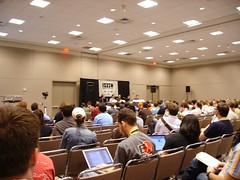 Panelists:
Panelists:
Michael Lopp
Cabel Sasser
Joshua Schachter
Joel Spolsky
Evan Williams
A number of interesting points raised. A few of the top ones:
Joshua Schachter, who developed del.icio.us was asked “Del.icio.us was a simple app, with a really simple interface. How did it end up going so viral, and become so popular?” Schachter:
“One of the things I did was put an RSS feed wherever I could in del.icio.us, so that people could access their information easily. They could take their information, put it in their blogs, share it, do anything they want with it.”
Question from the audience: “How do you turn your brand into users?”
Joel Spolsky: My blog, Joel on Software, has a big brand and a big reader base. Fog Creek makes bug tracking software, which isn’t something you buy every day. But it is important to our core audience of readers. So when they need bug tracking software, they think of us. When we’ve tried to develop things that were less applicable to my readers, those products didn’t catch on as well.
Question: How do you hire?
Joel: The one thing that works for us it to have summer interns. After the end of three months, we know if they’re going to be good or not. If they are good, we make them an offer that’s going to be the best offer of anyone in their graduating class. We can do that because there’s no risk…we know they are going to be good, and that it’s worth it. Also, your first five-six-seven hires have to be generalists…they need to be able to design, to build, to market, to do Quickbooks for a couple of weeks. After that, you can get specialists.
Evan Williams: In venture funded companies, there’s a situation where you hire too fast. You have to be careful of timing…your VCs, your board may be putting pressure on you to hire fast. When you have more than the two or three founders, and things are uncertain, and you have a dozen or twenty or more people to get up to speed when things change, it can be deadly.
Schachter: With del.icio.us, we did a variant on the intern thing…we’d hire consultants. My first hire was a guy who kept sending in bug reports to my code. He worked for us for six months before I ever met him…he lived up in the boonies in Toronto. The other thing is to get an office assistant…all that stuff that’s “not the product,” and I was wasting my time on stuff that wasn’t part of our core.
Question: What if you have a great idea, but aren’t technical. What do you do?
Joel: Get a co-founder. Ideas are easy. It’s the execution that’s hard. Get a co-founder…if you can’t find at least one other person who is will to devote themselves to the idea, it’s probably not that good.
Sasser: Keep whittling down that idea, to it’s simplest form. Make sure you can explain it.
Question: What’s the mistake you made that almost sent the whole company down the tubes?
Schachter: For me, it was almost not-doing-it. I was on the fence for about two years. I was lucky…it seemed I made a lot of good choices.
Joel: One thing we did was an affiliate program, and all sorts of promotional efforts. None of those things ever worked. The thing that worked? Creating improved versions of our products. When we come out with a new version, our sales double.
Question from the audience: Did anyone on the panel have a business plan?
Panel: ::crickets::
Sasser: Make things that you want to use. Your heart will be in it, your passion will be in it.